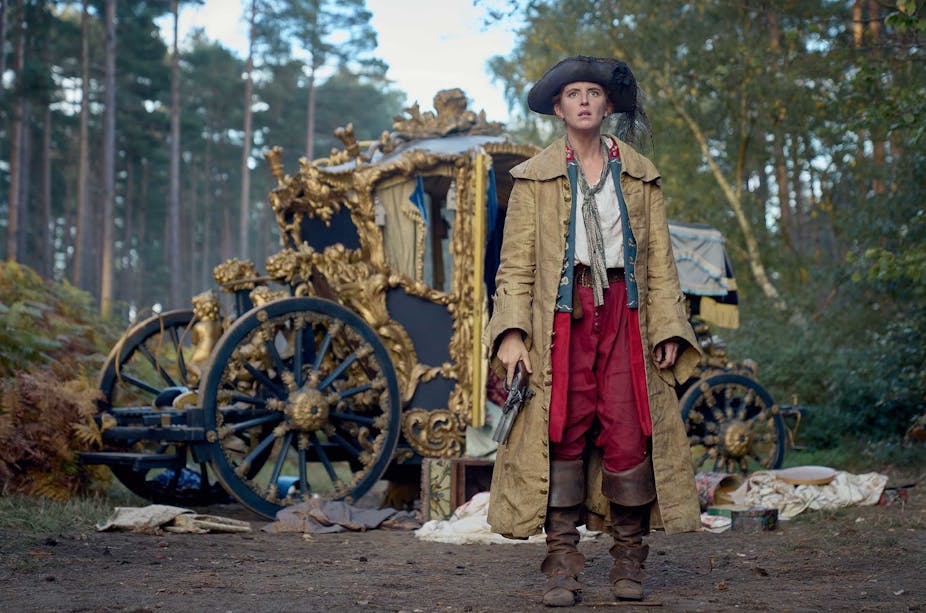“Little word of warning. You don’t want to mess with me”, Nelly Jackson tells highwayman Isambard Tulley in the opening minutes of Renegade Nell. The Disney+ fantasy adventure series is the latest show from Happy Valley writer, Sally Wainwright.
Nell has inadvertently stumbled on Tulley and his gang robbing a group of wealthy travellers in the woods. The date is 1705 and Nell is returning to her family tavern in Tottenham, widowed, after her husband, Captain Jack was “blasted in half at the Battle of Blenheim”.
Despite this horrifying set of circumstances, Nell (or Nelly as her family call her, much to her annoyance), is remarkably upbeat, her cockney wit as quick and cutting as her sword skills.
The series sets up a story world inhabited by characters that are smart, resourceful, camp, canny and highly amusing. While tragedy and greed take up space in the dark edges of the plot and the minds of the show’s villains, it is humour that occupies its centre.
This comes courtesy of both Wainwright’s sharp writing and the performances of Nell, played by Louisa Harland of Derry Girls fame, and Billy Blind, her magical, pint-sized spirit, played by comedian and actor Nick Mohammed.
Mohammed purposefully uses his most famous comedic creation, Mr Swallow, in his role as Billy Blind, drawing on both Mr Swallow’s squeaky voice, and his pattern of biting off more than he can chew.
Harland’s performance as Nell is equally magical, driving the narrative at breakneck speed. Her supernaturally powered fight sequences are something to behold, and she showcases a multitude of accents, from contemporary cockney to “posh” Scottish.
Sally Wainwright’s safe hands
Sally Wainright, the creator, executive producer and writer of the first five episodes of the series, is largely considered a safe – and extraordinarily capable – pair of hands. Wainwright is most well-known for Scott & Bailey (2011), Last Tango in Halifax (2012), Happy Valley (2014) and Gentleman Jack (2019).
Read more: Happy Valley: the art of Sally Wainwright's perfect TV ending
Renegade Nell sees Wainwright parry with and between genres, themes and styles for which she is less well known. The magic realism and playful spirit that frames Renegade Nell may feel worlds away from Happy Valley, but – as with Wainwright’s indomitable women characters and frequent focus on class inequalities – magic realism does have precedence in her back catalogue.
Wainwright’s reimagination of the three Brontë sisters in the BBC film To Walk Invisible (2016) included scenes of the siblings as children, their heads adorned with burning crowns of fire. Renegade Nell has a similar interest in the magical relationship between three extraordinary but very different sisters.

The show is a magical mix of Wainwright’s previous creative expertise. Its adventure is drawn from Jane Hall (2006) and comedy from Bonkers (2007). It has period costume and a musical score reminiscent of Gentleman Jack and magic realism from To Walk Invisible.
Then there’s the determination and resilience from Happy Valley, and the focus on family, care, community and class that was inherent to Wainwright’s soap opera writing for Coronation Street.
A class act
Alongside its interest in women and the inequalities they experience and battle to overcome, a theme central to Renegade Nell is social class.
With Nell as our guide, the structural inequalities between the wealthy and the poor are aligned directly to power and its abuses. The law, Nell tells us, “is made by the toffs, for the toffs”. Ending up on the wrong side of it, she talks to Billy Blind, joking and lamenting in equal measure: “How come I’ve ended up so far on the wrong side of the law?”
In response, Billy suggests, “Maybe when someone like you ends up on the wrong side of the law … there’s something wrong with the law … and maybe me and you was supposed to do some disruption to redress the balance.”
Their work to redress the balance, alongside an exceptional cast of supporting characters, explores the corruption of government, the control of the news and questions of truthful and objective reporting, poverty and gender-imbalanced opportunities.
Though the setting in 16th century England provides a sense of temporal distance, the contemporary relevance of the issues explored are unlikely to be lost on viewers, who may well be inspired to join Nell in kicking up a rumpus.

Looking for something good? Cut through the noise with a carefully curated selection of the latest releases, live events and exhibitions, straight to your inbox every fortnight, on Fridays. Sign up here.

